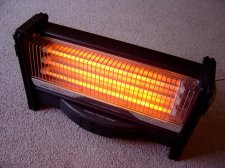Winter Time Equals Space Heaters
December, January and February are the leading months for U.S. home fires and home fire deaths. On average, more than 1/3 of home fire deaths in the United States occur during the winter months. CRITICAL ELEMENTS of home heating safety have to do with correct INSTALLATION, MAINTENANCE, FUELING, andOPERATION of portable and space heaters, as well as safely arranging household items around them.
Major Causes Of Home Heating Fires:
- Lack of regular cleaning of chimneys in fireplaces and woodstoves.
- Placing things that can burn too close to space and portable heaters.
- Flaws in design, installation or use.
- Fueling errors involving liquid, or gas-fueled heaters.
- Leaving portable or space heaters unattended.
Tips for preventing home heating equipment fires:
- When purchasing equipment, select ones that have the mark of an independent testing laboratory.
- Install and maintain heating equipment correctly.
- Make sure the equipment complies with local fire and building codes.
- Read and follow the manufacturer's instructions when using a heating device.
Portable and other Space Heaters:
- All types must be kept at least 36 inches from anything that can burn, including furniture, bedding, clothing, pets and people.
- Space heaters must not be left operating when you are not in the room, or when you go to sleep.
- Children should be supervised at all times when space heaters are in use.
- Do not put drying clothing or combustibles over heaters.
- Check for fraying or splitting wires, or overheating. Have problems repaired by a professional before operating the space heater.
Fireplaces:
- Have chimney inspected by a professional prior to the start of every heating season, and cleaned if necessary.
- Creosote, a chemical substance that forms when wood burns, builds up in chimneys and can cause a chimney fire if not removed through cleaning.
- Use a sturdy fireplace screen.
- Make sure the flu is open while in use.
- Burn only wood. Never burn paper or pine boughs which can float out the chimney and ignite your roof or a neighboring home.
- Do not use flammable liquids in a fireplace.
- If decorating fireplace with Christmas stockings or other season decorations, DON'T BURN FIRES IN IT!
- Do not burn wrapping papers in the fireplace. A flash fire may result as wrappings ignite suddenly and burn intensely.
Carbon Monoxide Poisoning
About 230 people die each year from CO poisoning related to fuel burning household appliances, such as furnaces, space heaters, water heaters, clothes dryers, kitchen ranges, wood stoves and fireplaces.
Each year, approximately 25 people die and hundreds more suffer from carbon monoxide poisoning when they burn charcoal in enclosed areas such as their homes - in a bedroom or living room for heat or cooking. Some also burn charcoal in campers or vans, or in tents. When inhaled, carbon monoxide, a tasteless, odorless gas, is easily absorbed into the blood. The gas is lethal when it replaces the amount of oxygen needed to sustain heart and brain function. Symptoms of carbon monoxide poisoning include headaches, fatigue, weakness, shortness of breath, and nausea, are often dismissed as a "touch of the flu," even by doctors.
Tips:
- Never use a vented-type heater without proper venting and flue (chimney).
- Follow manufacturer's recommendations for the proper size heater and for its installation, maintenance and use. Have it professionally installed, if possible.
- Have your heater installation checked by the local fire marshal, building inspector, or gas company before lighting.
- Never use a heater that is in disrepair. Always keep your heater in proper operating condition.
- Turn off the heater if the burner flame looks strange, i.e., yellow flames, unsteady flames, or smoky flames.
- Turn off the heater, ventilate the room and get into the fresh air if you feel other than normal, i.e., headache, nausea, fuzzy vision--remember CO does not have a odor and you may become unconscious before you realize there is a problem.
- Make sure the venting system is open--a blocked vent can cause your space heater to exhaust CO into your living space.
- Never sleep in a room where a gas heater is burning.
- Do not operate a gas heater in a completely 'tight' room. The heater needs a source of fresh air to operate safely and efficiently. 'Crack' a window, if needed.
